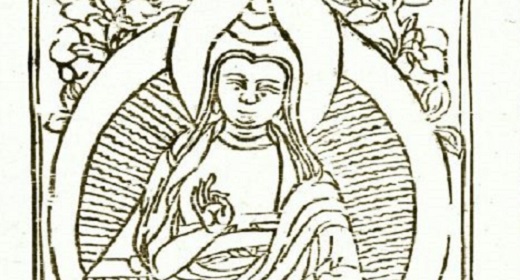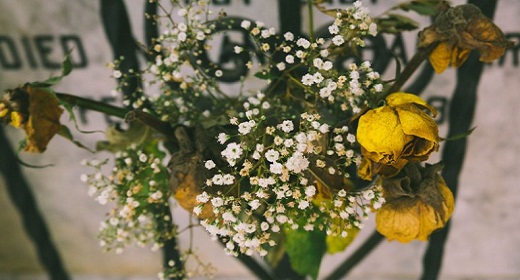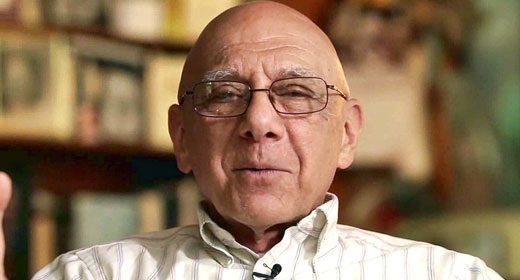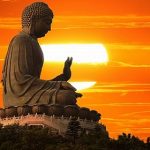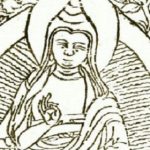By Barbara Graham: After years of spiritual practice, Jack Kornfield found he had emotional and relationship issues still unaddressed. 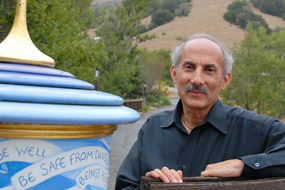 Since then, he has become a pioneer in joining Buddhist meditation with Western psychology.
Since then, he has become a pioneer in joining Buddhist meditation with Western psychology.
The man in the ocher-colored robes sits cross-legged, eyes gently shut, palms half-open like seashells resting lightly on his knees. His head is freshly shaved and his faithful begging bowl is by his side.
There’s nothing unusual about the sight of a humble monk meditating — not in Asia, where he’s spent the last five years. But this monk’s not in Asia anymore, he’s in the reception area of Elizabeth Arden’s Red Door Salon in Manhattan, waiting for his sister-in-law. He’s jolted out of his blissful state by a throng of women—some with faces slathered in mud, others with hair in rollers that remind him of fishing reels—laughing at him. The instant he opens his eyes, he realizes that life as a barefoot renunciate isn’t going to play on Fifth Avenue, or anywhere else in America, the way it did in Thailand.
The year was 1972 and Jack Kornfield had just returned to the States a fully ordained monk in the Theravada Buddhist tradition. “It was pretty obvious that I was going to have to find a way to reconcile the ancient teachings with our modern world,” he tells me in his signature singsong voice.
Since that day nearly thirty years ago, that’s exactly what he’s been doing: translating the path of liberation into a contemporary idiom, making it relevant for Americans. “Jack’s a visionary, a pioneer,” says Sharon Salzberg, who in 1975 co-founded the Insight Meditation Society with Kornfield and Joseph Goldstein in Barre, Massachusetts. “He’s got this incredible energy and bravery. He likes to play the edge, not out of disrespect but out of wanting the faith to be authentic.”
In his quest to transpose the dharma from an Asian monastic setting to a Western householder context, one of Kornfield’s chief preoccupations has been relationships. “There’s a way of dividing the Eightfold Path into three categories: right view, right relationship and right meditation,” says New York City author and psychiatrist Mark Epstein, a student and friend of Kornfield’s since the seventies. “I’ve always seen Jack as the embodiment of right relationship.”
“I believe, especially for us in the West, that relationship is one of the central practices we have,” Kornfield affirms. “It contains all the Buddhist training for perfection of wisdom, generosity, patience, truthfulness and compassion.” And there’s no escape. “When your guru asks you to stay up all night meditating, it’s still possible to go to sleep,” he says. “But when your baby is wailing at three o’clock in the morning, you have no choice except to get up and take care of her.”
His imperative to explore relationships in light of the dharma is not surprising, given his own painful family history. Kornfield’s father was a hot-tempered, sometimes physically abusive scientist whose peripatetic work life kept the family—Jack, his mother and three brothers—moving from city to city. Jack was the designated peacekeeper, a shy and awkward kid who figured out early that intelligence and worldly success did not necessarily add up to a happy life.
Inspired by a professor at Dartmouth College, he majored in Asian Studies. After graduating in 1967, he joined the Peace Corps and set off for Thailand, determined to study Buddhism and trade his angst for rapture. He soon made his way to the forest monastery of Ajahn Chah, a master in the Thervada tradition. There, with little more than a robe and a bowl to call his own, Kornfield underwent traditional training. He walked five miles each day to collect food for the single midday meal, practiced long hours of meditation—including a one-year silent retreat—and in 1969 was ordained as a monk. In subsequent years, he widened his circle of teachers to include Burmese master Mahasi Sayadaw, Advaita teacher Nisargadatta Maharaj, and vajrayana guru Kalu Rinpoche.
Kornfield’s life seems to have served as the laboratory for his evolving view of the dharma. After returning from Asia he was shocked to discover that despite his experiences of bliss and awakening in the monastery, his interactions with people at home were just as troubled as they’d been before he left.
“I was emotionally immature, and all the old struggles with family and friends came right back,” he recalls. He also realized that, instead of liberating him, the strength of mind he’d cultivated in meditation had actually suppressed his feelings. “I didn’t know how to deal with them, and most of the time I didn’t even know what I felt.” In fact, he was so out of touch that a girlfriend gave him a notebook in which to record his feelings and preferences so that he could begin to know what they were. “Recovering my feelings was a long and life-changing process,” he says.
What’s more, he recognized that he couldn’t do it alone. “I needed the connection with another human being in therapy,” Kornfield tells me from the home he shares with his wife, Liana, and their 16-year-old daughter, Caroline, near Spirit Rock Meditation Center in northern California. In his compelling new book, After the Ecstasy, the Laundry—a map of the spiritual journey based on Kornfield’s experiences, as well as those of teachers in many traditions—he elaborates: “To find myself still struggling with my emotions was hard. The therapist was essential as a compassionate witness, another being to help me face the images and fears I carried in my body, everything that I had not been able to face alone.” This understanding—that healing our emotional wounds and relationships is as much a part of spiritual development as moments of unbounded freedom and awakening—inspired him to get a doctorate in psychology and practice psychotherapy, in addition to teaching meditation.
“I don’t define the world in terms of spiritual or psychological,” he explains. “As the Buddha taught, there’s suffering, the cause of suffering, which is our fear and confusion, and the end of suffering. Sometimes meditation alone isn’t enough. For example, students often come to me with problems that surface again and again. Maybe it’s their fourteenth relationship in five years, or a pattern of feeling unworthy. Whatever it is, they discover that just sitting with their pain doesn’t transform it or bring liberation. At that point, it’s necessary to shift from the universal level to the personal level, and tell enough of the story in order to make conscious the small sense of self that perpetuates the suffering.”
When I ask him about the danger of getting lost in our storyline and reinforcing the notion of a solid self, he suggests that the question itself is specious. “It’s not so simplistic—get rid of the self and everything will be fine,” he points out. “For one thing, as Ajahn Chah taught, the concept of ‘self’ and ‘no-self’ is a false dichotomy. It would be more accurate to say that there’s unhealthy attachment and healthy attachment—which can occur in relation to experiences of emptiness as well to our notions of self.” Moreover, he adds, both self and no-self—the personal and the universal—are legitimate dimensions of our practice. One is about honoring and respecting what is unique about us, the other is about letting go.
“The heart is very trustworthy,” he says. “When something difficult comes in spiritual life, it’s because it needs our loving attention.” As far as Kornfield is concerned, it makes no difference whether we pay attention in the presence of a therapist, during meditation—or both. “The whole task of liberation is not to rid ourselves of our defenses, but to discover the purity that lies underneath. But that can only happen when we hold or touch the body of fear, the small self, with great compassion.” This is especially important for us in the West, where the emphasis on the individual has produced a society suffering from epidemic loneliness and self-hatred—afflictions that are virtually unknown in the communal Asian cultures where Buddhism first flowered.
Besides, Kornfield assures me, whether we’re talking about seeing a therapist, sitting on the cushion or going to the grocery store, we don’t need to worry so much about whether or not we’re being spiritual. “It’s a delusion to say that this is the spiritual part of one’s life, this is the financial part, this is the psychological part. That’s insane. Spirituality isn’t about any particular realm or dimension to be liberated. It means liberation in the heavens and hells, in the monastery and the marketplace. It means liberation of the body, the emotions, and relationships with all other beings.”
Bottom line, as he writes in After the Ecstasy, the Laundry, “The lesson of spiritual life is not about gaining knowledge, but about how we love. Are we able to love what is given to us, love in the midst of all things, love ourselves and others?” If the answer is no to any part of the question, then, suggests Kornfield, we must take whatever steps are necessary, using body, heart and mind, to open ourselves and rest in our natural perfection.
“Jack has an all-embracing, mahayana vision of the dharma in which no aspect of life is excluded,” says Mark Epstein. “He’s taken this classical form of Buddhism and grafted it onto our worldly and complicated householder life.”
Spirit Rock, the meditation center Kornfield founded with Sylvia Boorstein and other vipassana teachers in 1989, is arguably the embodiment of that vision in which relationship and community are central. Unlike the retreat-oriented Insight Meditation Society, which he left in 1984, Spirit Rock, magnificently situated among the undulant hills of West Marin, was already a thriving community center, with programs for families, teens, parents, gays, lesbians, clergy and people of color, when its residential retreat facilities opened in 1998. Today, hundreds of seekers pass through Spirit Rock’s gates each week to attend Kornfield’s famed Monday night dharma talks, as well as other offerings.
Since most of the people who attend classes and retreats at Spirit Rock—and elsewhere in the West, for that matter—haven’t had the benefit of years of traditional monastic training the way Kornfield has, I ask if it’s harder to wake up in the real world than in the monastery. The response strikes me as classic understated, ever-witty Jack: “It’s hard to practice as a householder.” Pause. “It’s also hard to practice as a monk or a nun.” Either way, he explains, “you’re living in a community with a lot of personal relationships, which become a focus of practice. The first seven volumes of the Buddhist sutras are all about community and working through the difficulties that inevitably come up.”
But he also believes that just as living in a monastery offers certain advantages, so does living in the world, with its challenges and multiple roles, such as parenthood and partnership. “In the household life, as difficult and complex as it is, the opportunity exists to get trapped or discover freedom right in the middle of it,” he says, noting that family is the mirror in which all our wounds, as well as our blind spots, get magnified.
In talking to Kornfield, I sense that he takes nothing for granted. He has a quicksilver, incisive mind that relentlessly questions, examines, reexamines and tests every hypothesis against his own experience—exactly as the Buddha himself exhorted his disciples to do. This lends a certain streetwise—or, more accurately, pathwise—quality to Kornfield, who seems at once compassionate and fierce. There’s also a directness and clarity to his speech.
My impressions of his honesty and candor are shared by others. In the dharma world, he’s known as a truth-teller. “Jack is fearless,” says Sharon Salzberg. “He’s always questioning everything, like how this tradition deals with sex, money, women, abuses of power. At times, he’s been the voice of unwelcome truths.”
Sylvia Boorstein, Kornfield’s friend and colleague, remembers a 1995 meeting of Western Buddhist teachers in Dharamsala, when Jack characteristically pushed the envelope. “He opened the meeting by suggesting that we go around the room and share the most significant spiritual challenges we were facing personally and in our teaching,” Boorstein recalls, adding that many of the teachers present hadn’t met one another before. “He might as well have said, �Let’s start by taking off all our clothes.’ Jack always asks the hardest questions and establishes the most intimacy right up front. Then he jumps in and is the first one to be self-disclosing. He’s a role model for doing this work with incredible honesty and integrity.”
As part of Kornfield’s drive to keep things clean, he’s been a prime mover in bringing together Buddhist teachers from across the lineages to compare notes and learn from each other’s successes and missteps. Epstein refers to him as “the United Nations of Buddhism”; Boorstein calls him the “Sol Hurok of Buddhism,” after the well-known theatrical impresario. This June, Spirit Rock hosted an historic gathering of nearly two hundred Asian and Western teachers, including the Dalai Lama.
“My goal was to put everyone together in the same room so that we could get to know each other, and collaborate and support each other,” Kornfield says, noting that throughout Buddhist Asia conflict and competition have been common. “Prejudice is much less likely to arise when you come face to face with people whose approaches are different from yours. One of the radical things that’s happening in America is the free flow of dialogue among the traditions.”
But his passion for bringing people together and dissolving their differences through ritual and truth-telling is not limited to the Buddhist universe. For years he’s been teaching men’s retreats, sometimes with Robert Bly, James Hillman and Michael Meade. More recently, Kornfield has turned his attention to the wounds perpetrated by racism and, together with Hillman and Malidoma Some, an African spiritual teacher, has been leading retreats for young people from inner cities, many of them ex-gang members. At a recent gathering in southern California, he reports, “We built an altar on which the participants placed stones for all the young men they knew who’d been killed in gang fights. We stayed up all night around the fire, drumming, talking, hearing African, Mayan and Buddhist stories about how to deal with conflict and violence. It was a kind of initiation ritual. This has become a very compelling part of my teaching.”
When I ask Kornfield, now fifty-five, how he’s changed as a teacher since he taught his first meditation class at The Naropa Institute twenty-six years ago, he says that in the beginning he was much feistier and more confrontational. “Buddhism has a lot of warrior energy. There’s a lot of talk about doing battle against Mara or the defilements, about overcoming the hindrances and ridding ourselves of hatred and delusion, and so I taught that way. But then two things happened. In my own life I started to do a lot of emotional work, which began to transform my practice. And as a teacher I started seeing how students, who already felt worthless, used spirituality to judge themselves and fight against themselves and try to make themselves ‘better’ people. It became a self-improvement game. So the biggest shift has come from understanding that for wisdom to open, it has to rest in compassion. Otherwise, you’re just playing into the dualistic mind that wants to hold some things as bad and other things as good, which keeps us in chains.”
Kornfield describes his own ripening as a “journey down the chakras,” from refined meditative states into the heart and body. “I’m still going down, learning to embody and live the practice day by day—when I go to the store or speak to my teenage daughter or care for my own body as it ages. The dharma is fulfilled in the details and, as Maezumi Roshi said, details are all there are.
“At the same time I have the experience that’s common to a lot of long-time practitioners, which is that things become emptier, more transparent, more easily transformed. There’s not so much struggle. I suffer, but that’s the First Noble Truth. It’s not the suffering of resistance to the world, it’s just the human realm. There comes out of that a much deeper compassion, and the compassion is quite liberating. It’s the liberation of not removing oneself from the energies of life, but of resting the heart in the midst of it.”
Barbara Graham has written for the Utne Reader, Vogue, Self, Common Boundary and other publications. She is the author of the satire Women Who Run with the Poodles.


